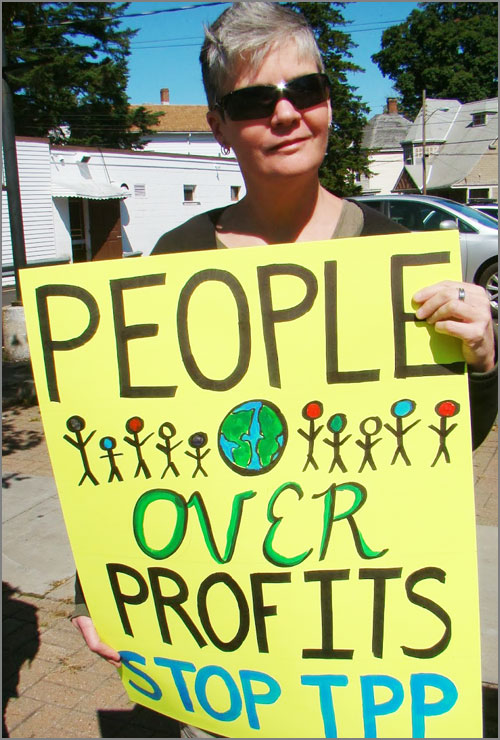Public forum on anti-people “trade” deal

The Guardian (Workers Weekly) | February 12, 2014
Public Forum on anti-people “trade” deal
Richard Titelius
As the Trans Pacific Partnership Agreement hurtles towards an indecently fast and secret finalisation between the states of 12 countries and a number of large transnational corporations, concerned citizens around the globe have been organising a resistance to this anti-democratic and anti-people “free trade” agreement.
In Perth a group known as the Perth Trans Pacific Partnership Community organised a public forum at the Alexander Library Theatre which was attended by about 70 people.
The proceedings were opened by Perth Whadjuk Noongar couple Robert and Selena Eggington who gave a welcome to country. Eggington spoke about the recent John Pilger documentary film Utopia (see review page 5) in which he had appeared and talked about the ongoing discrimination and marginalisation on Aboriginal people when looking for employment, education, housing and other government services.
Eggington spoke about the TPP Agreement and how it attacked the weak and vulnerable in society.
Natalie Lather, a Ph D student in climate change and poverty, said that the treaty was an offspring of the US-Australia free trade agreement. Lather said that the Department of Foreign Affairs and Trade has stressed that the TPP is about promoting free trade by getting rid of “Behind the Border Impediments”, which is shorthand for ensuring governments cannot interfere in the business dealings and profit-making of corporations – some of who are richer and more powerful than nation states.
Senator Scott Ludlam of the Greens spoke of the immense powers being ceded to corporations to decide what a government can and can’t do in the interest of the people who democratically elected them to parliament. Ludlam cited the case of the cigarette company that was suing the Australian government in a court in Hong Kong over its plain cigarette packaging laws which they claim are restriction to trade. Ludlam also quoted Noam Chomsky from a recent Huffington Post interview where Chomsky said of the TPP that, “They were highly protectionist measures designed to undermine freedom of trade and boost corporate political power and investor rights.”
Mia Pepper from the Conservation Council of Western Australia discussed the Environmental Chapter of the TPP which places restrictions on the ability of states to oppose the granting of mining leases on environmental or ecological grounds.
Already there have been several examples. The Canadian province of Quebec, in October 2013, tried to have a moratorium on fracking and was sued by Lone Pine Resources for $250 million under the North American Free Trade Agreement. Also US gold mining corporation Pacific Rim, in 2012, sued the nation of El Salvador as it tried to prevent a large mine being built that would have used a cyanide heat-leaching process to wreak havoc with that nation’s water resources.
Janet Grogan from Foodwatch spoke of the fight to keep Western Australia GM-free and give WA farmers to right to grow non-GM crops and WA consumers to have GM labelling and GM-free food.
Grogan said that the ability for farmers to save seeds for future crops was vital to their viability and sustainability. “In 20 years seed ownership had transferred from the hands of farmers into those of multinational chemical and pharmaceutical corporations such as Monsanto and Bayer, of which 90 percent of all GM seed patents are owned by Monsanto,” emphasised Grogan about the potential hazards of ceding corporate power to corporations such as Monsanto.
Grogan noted, “The chief negotiator of the TPP Agreement Agricultural Chapter is a former chief executive of Monsanto.”
To assist corporations deal with nation states, the corporations are pushing negotiators of the TPP to adopt Investor-State Dispute Resolution Settlement procedures which even the previous Liberal Howard government was reluctant to adopt. Such a settlement procedure could pave the way for resistance to GMOs being seen as an “anti-free trade practice”.
Grogan said there was also an alarming move by the EU to set up a Plant Variety Agency where farmers were required to submit their seeds for assessment and if they failed to do so they could be prosecuted.
In Melbourne there was a rally on February 7 attracting over 120 people which also protested the TPPA. Speakers included Steve Dargavel of the AMWU, Tom Warne-Smith of the Environmental Defenders Office and Sam Castro, an anti-GM protester and member of Whistleblowers, Activists and Citizens Alliance (WACA).
Castro said that following the rally it was decided to maintain the momentum from the action and an earlier forum by taking the movement to rural areas of Victoria to help farmers understand the issues with regards to agriculture and coal seam gas.





